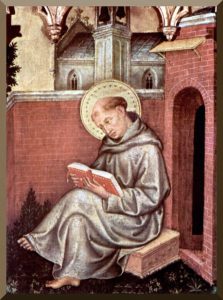don’t talk to the false mask
Saint Thomas Aquinas wrote that “to know that God exists in a general and confused way is implanted in human nature, inasmuch as God is man’s beatitude. For man naturally desires happiness, and what is naturally desired by man must be naturally known by him. This, however, is not to know absolutely that God exists; just as to know that someone is approaching is not the same as to know that Peter is approaching even though it is Peter who is approaching. For there are many who imagine that man’s perfect good, which is happiness, consists in riches, and others in pleasures, and others in something else.”[1]

Saint Thomas Aquinas
To which Peter Kreeft so cogently observes, “Everyone has some God, some ultimate end, some summum bonum (‘greatest good’). In this sense there are no simply non-religious human beings. An atheist too has a god: it is usually himself or his own pleasures, comforts, or joys…Therefore, when talking with ‘non-religious’ people, do not accept their false belief that there are two kinds of people: ‘religious people’ and ‘non-religious people’. Don’t talk to the false mask they wear; talk to the real hunger within. It is always there.”[2]
What we may properly deduce from this is a much broader and more universal delineation of the term “religion”; one that steps outside and well beyond the boundaries of normative religious connotations. Religion, by definition, is an organized collection of beliefs, cultural systems, and world views that relate humanity to an order of existence. If we are to assume this to be true and if there are, as Kreeft states, no non-religious human beings then it logically and reasonably follows that all human beings must, by their nature of being human, belong to or be in association with some form of religion, whether they wish to admit to it or not.
While I have mentioned it before it bears repeating: any and all religions are cultural systems, each carrying its own specific portfolio of interests, tenets, and beliefs, and with this rudimentary understanding what anyone ascribes as important, whether it be a specific pursuit (a sport, avocation, or career) or interest (cooking, philately, or gardening,) can thus be and ought to be defined as a religion. Even if we were to place God squarely in the mix, as has traditionally been the case, religious membership remains universal and complete. When atheists or secularists bow before their god or gods of self-adulation, personal pleasure, comfort, or joy, they are simply satisfying their natural desire for happiness, some perceived summum bonum (“greatest good”) and are therefore practicing their religion.
In a rather perverse sort of way those who have so stridently objected to even the slightest breath of religious ideology wafting upon the public square and within any public discourse have incorporated their own religion, if not de jure then at least de facto, into the very fabric of our national ethos while surreptitiously circumventing our legal system and our national consciousness. They have in effect established a state supported religion by simply not identifying it as such, something for which we should all share grave concern and give serious consideration for the future of our religious liberty.
[1] Saint Thomas Aquinas, Summa Theologiae, I, 2, 1.
[2] Peter Kreeft, Practical Theology: Spiritual Direction from St. Thomas Aquinas, 5. The reality and inadequacy of our innate knowledge of God.
